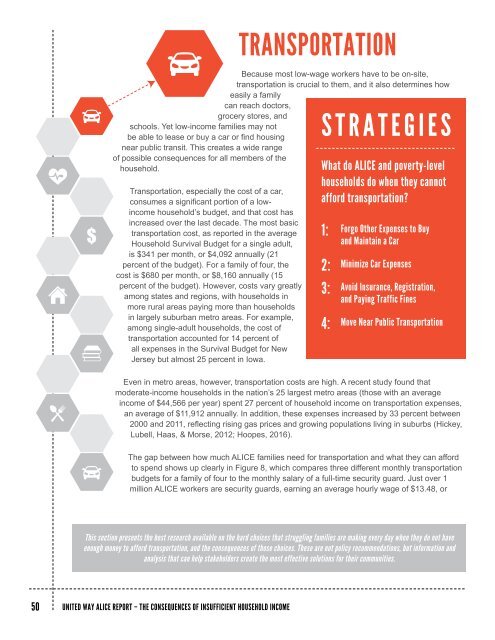The Consequences of Insufficient Household Income
This new Consequences of Insufficient Household Income report provides a deeper level of understanding of the choices that ALICE and poverty-level families across the country make when they do not have enough income or assistance to afford basic necessities, and the consequences of those choices.
This new Consequences of Insufficient Household Income report provides a deeper level of understanding of the choices that ALICE and poverty-level families across the country make when they do not have enough income or assistance to afford basic necessities, and the consequences of those choices.
You also want an ePaper? Increase the reach of your titles
YUMPU automatically turns print PDFs into web optimized ePapers that Google loves.
schools. Yet low-income families may not<br />
be able to lease or buy a car or find housing<br />
near public transit. This creates a wide range<br />
<strong>of</strong> possible consequences for all members <strong>of</strong> the<br />
household.<br />
Transportation, especially the cost <strong>of</strong> a car,<br />
consumes a significant portion <strong>of</strong> a lowincome<br />
household’s budget, and that cost has<br />
increased over the last decade. <strong>The</strong> most basic<br />
transportation cost, as reported in the average<br />
<strong>Household</strong> Survival Budget for a single adult,<br />
is $341 per month, or $4,092 annually (21<br />
percent <strong>of</strong> the budget). For a family <strong>of</strong> four, the<br />
cost is $680 per month, or $8,160 annually (15<br />
percent <strong>of</strong> the budget). However, costs vary greatly<br />
among states and regions, with households in<br />
more rural areas paying more than households<br />
in largely suburban metro areas. For example,<br />
among single-adult households, the cost <strong>of</strong><br />
transportation accounted for 14 percent <strong>of</strong><br />
all expenses in the Survival Budget for New<br />
Jersey but almost 25 percent in Iowa.<br />
TRANSPORTATION<br />
Because most low-wage workers have to be on-site,<br />
transportation is crucial to them, and it also determines how<br />
easily a family<br />
can reach doctors,<br />
grocery stores, and<br />
STRATEGIES<br />
What do ALICE and poverty-level<br />
households do when they cannot<br />
afford transportation?<br />
Even in metro areas, however, transportation costs are high. A recent study found that<br />
moderate-income households in the nation’s 25 largest metro areas (those with an average<br />
income <strong>of</strong> $44,566 per year) spent 27 percent <strong>of</strong> household income on transportation expenses,<br />
an average <strong>of</strong> $11,912 annually. In addition, these expenses increased by 33 percent between<br />
2000 and 2011, reflecting rising gas prices and growing populations living in suburbs (Hickey,<br />
Lubell, Haas, & Morse, 2012; Hoopes, 2016).<br />
1:<br />
Forgo Other Expenses to Buy<br />
and Maintain a Car<br />
2: Minimize Car Expenses<br />
3: Avoid Insurance, Registration,<br />
and Paying Traffic Fines<br />
4: Move Near Public Transportation<br />
<strong>The</strong> gap between how much ALICE families need for transportation and what they can afford<br />
to spend shows up clearly in Figure 8, which compares three different monthly transportation<br />
budgets for a family <strong>of</strong> four to the monthly salary <strong>of</strong> a full-time security guard. Just over 1<br />
million ALICE workers are security guards, earning an average hourly wage <strong>of</strong> $13.48, or<br />
This section presents the best research available on the hard choices that struggling families are making every day when they do not have<br />
enough money to afford transportation, and the consequences <strong>of</strong> those choices. <strong>The</strong>se are not policy recommendations, but information and<br />
analysis that can help stakeholders create the most effective solutions for their communities.<br />
50 UNITED WAY ALICE REPORT – THE CONSEQUENCES OF INSUFFICIENT HOUSEHOLD INCOME




